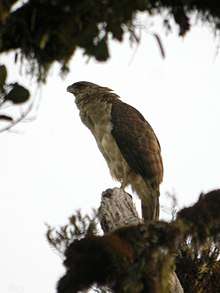Papuan eagle
The Papuan eagle (Harpyopsis novaeguineae) also known as the Papuan harpy eagle, New Guinea eagle, or Kapul eagle, is a large (length 75–90 cm, wingspan 157 cm, weight 1600–2400 g)[2] greyish brown raptor with a short full crest, broad three-banded wings, powerful beak, large iris, long rounded tail and white underparts. It has long and powerful unfeathered legs with sharp claws. The sexes are similar, and the female is slightly larger than the male. It is the only member of the genus Harpyopsis.
| Papuan eagle | |
|---|---|
 | |
| Scientific classification | |
| Kingdom: | Animalia |
| Phylum: | Chordata |
| Class: | Aves |
| Order: | Accipitriformes |
| Family: | Accipitridae |
| Subfamily: | Harpiinae |
| Genus: | Harpyopsis Salvadori, 1875 |
| Species: | H. novaeguineae |
| Binomial name | |
| Harpyopsis novaeguineae Salvadori, 1875 | |
The Papuan eagle is endemic to undisturbed tropical rainforests of New Guinea, where it became the top predator of the island after the extinction of local giant monitor lizards and possibly Thylacoleo. The diet consists mainly of phalangers or Kapul in a local language, hence its alternative name. It also feeds on other mammals, birds and snakes. Singing dogs are known to steal the bird's kills; in turn, the canids are part of the bird's diet.[3]
One of a group of four large eagles, the others being the crested and harpy eagle of South America and the Philippine eagle of the Philippines (although the latter may be more closely related to species of snake eagle around the world), the New Guinea harpy eagle is essentially a mountain bird that nests in high forest trees, but may be found down to sea level in the few places where forests remain undisturbed.
Due to ongoing habitat loss, small population size, and hunting for its feathers which are used on ceremonial occasions, the Papuan eagle is evaluated as Vulnerable on the IUCN Red List of Threatened Species.[1] It is listed on Appendix II of CITES.
References
- BirdLife International (2012). "Harpyopsis novaeguineae". IUCN Red List of Threatened Species. 2012. Retrieved 26 November 2013.CS1 maint: ref=harv (link)
- del Hoyo, J. Elliott, A. and Sargatal,J.(1994) Handbook of the Birds of the World. Volume 2:New World Vultures to Guineafowl. Lynx Edicions, Barcelona
- The New Guinea singing dog: Its status and scientific importance, Article in Australian Mammalogy 29(1) · January 2007 DOI: 10.1071/AM07005
